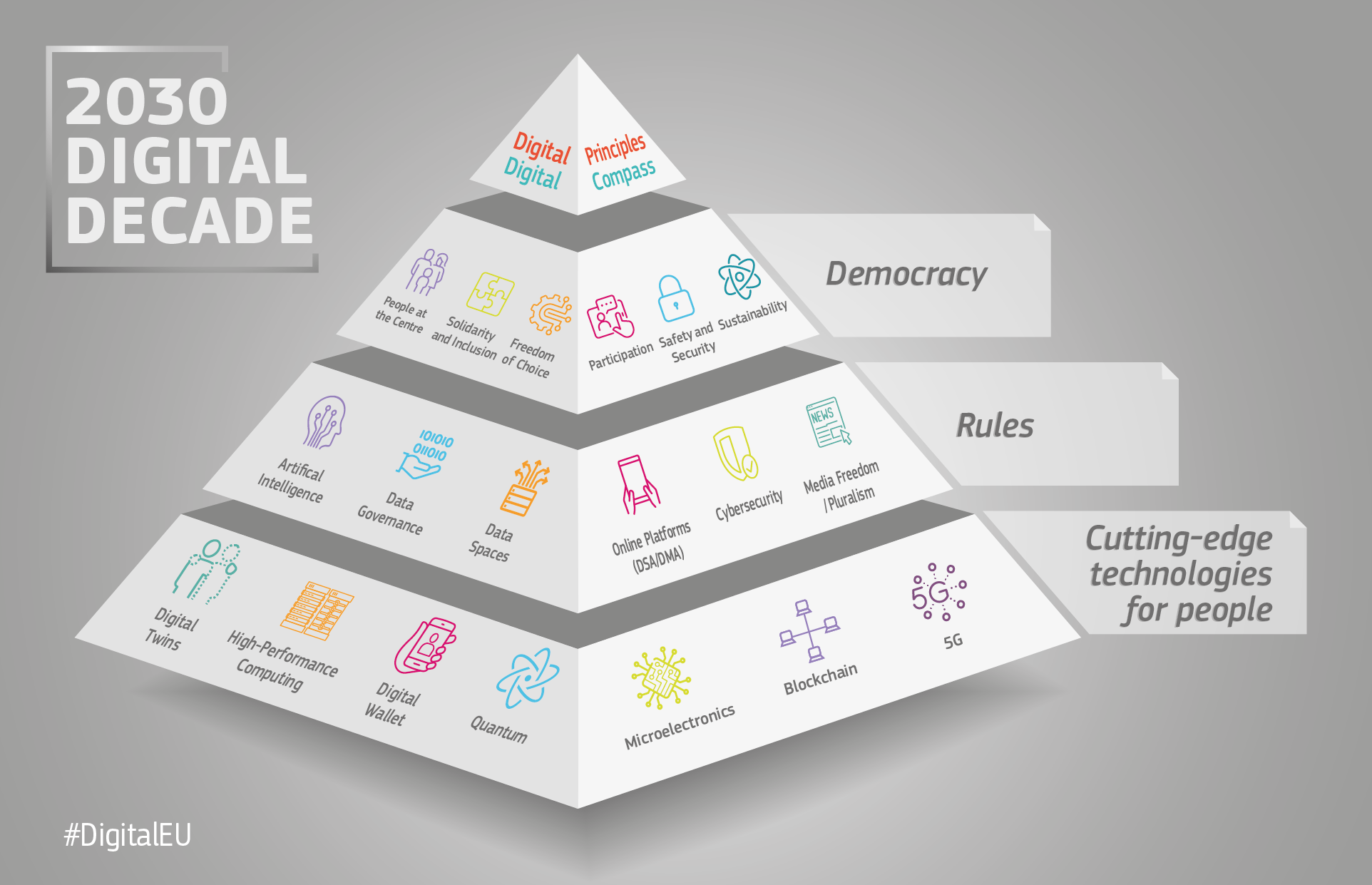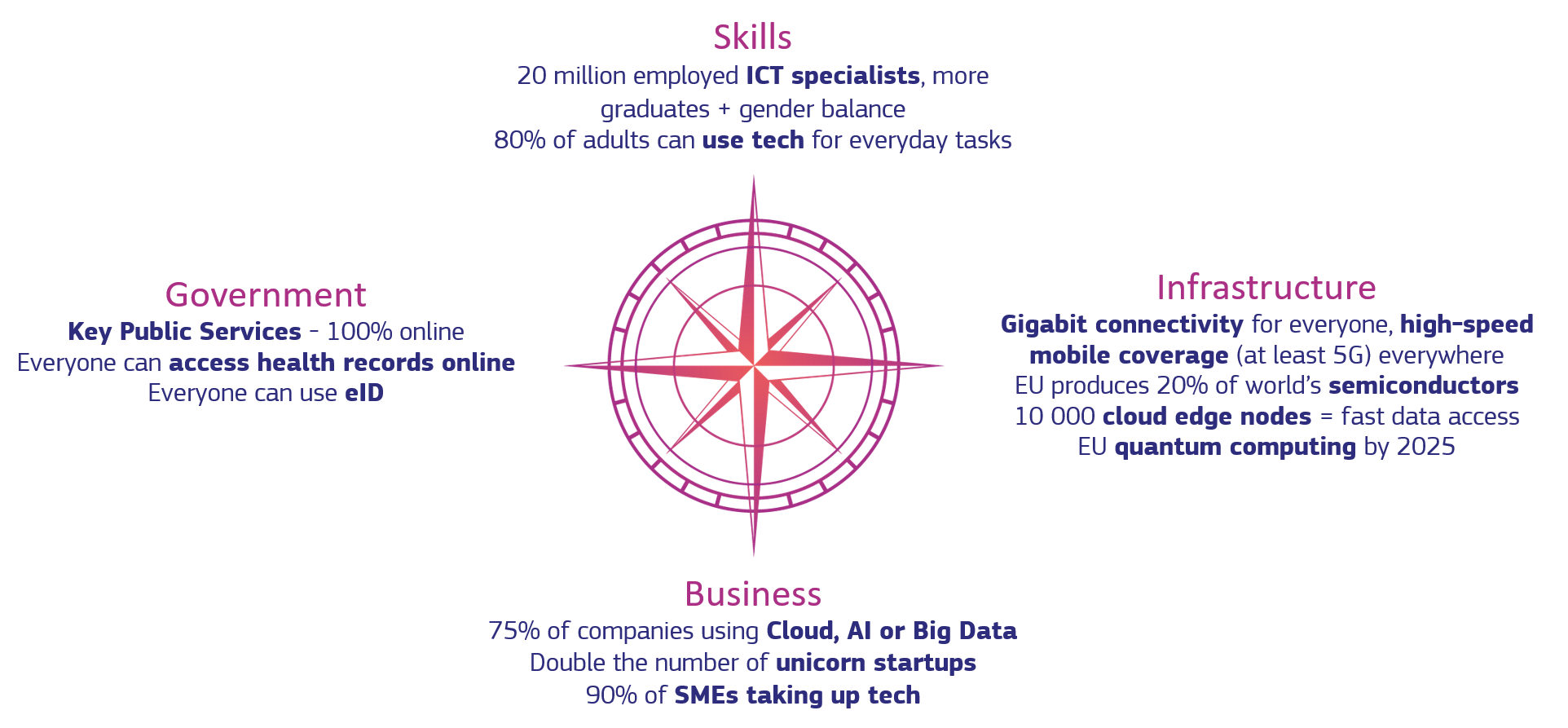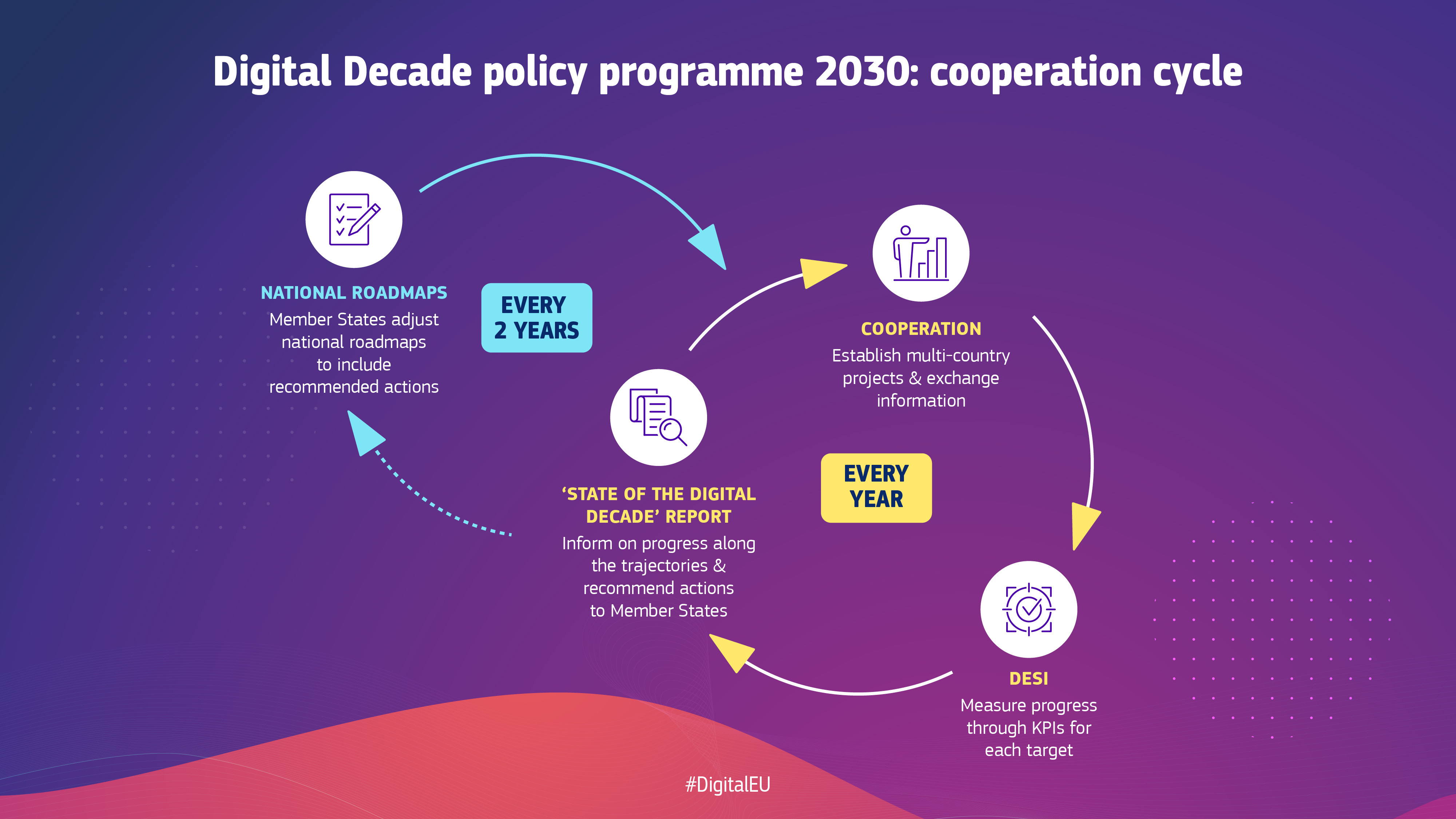The EU is pursuing a human-centric, sustainable vision for digital society throughout the digital decade to empower citizens and businesses.

Digital society and digital technologies bring with them new ways to learn, entertain, work, explore, and fulfil ambitions. They also bring new freedoms and rights, and give EU citizens the opportunity to reach out beyond physical communities, geographical locations, and social positions.
However, there are still many challenges associated with the digital transformation. The digital world should be based on European values – where no one is left behind, everyone enjoys freedom, protection and fairness. Europe’s Digital Decade is where everyone has the skills to use everyday technology. Even small businesses use technology to make better business decisions, interact with their customers or improve parts of their business operations. Connectivity reaches people living in villages, mountains and remote areas, so everyone can reach online opportunities and participate in the benefits of the digital society. Key public services and administrative procedures are online for the convenience of citizens and businesses.
European Union 2021
The Digital Decade is a comprehensive framework that guides all actions related to digital. The aim of the Digital Decade is to ensure all aspects of technology and innovation work for people.
The framework for the Digital Decade includes the Digital Decade policy programme, the Digital Decade targets, the objectives, the multi-country projects and the Digital Decade rights & principles:
- The Digital Decade targets are measurable goals for each of the four areas: connectivity, digital skills, digital business, and digital public services.
- The Digital Decade objectives guide Member State actions. The Commission informs about the Member States’ actions in the annual report.
- The Digital Decade policy programme allows the EU and the Member States to work together to reach the Digital Decade targets and its objectives. It lays down a mechanism to monitor progress towards 2030. Every year, the Commission publishes a report to take stock of the progress made.
- The multi-country projects allows Member States to pool investments and launch large-scale, cross-border projects.
- The Digital Decade rights and principles reflect EU values, which have to be respected in the digital world, as signed in the Declaration on Digital Rights and Principles.

Targets and objectives
The Digital Decade policy programme sets out digital ambitions for the next decade in the form of clear, concrete targets. The main goals can be summarised in 4 points:
- a digitally skilled population and highly skilled digital professionals
- secure and sustainable digital infrastructures
- digital transformation of businesses
- digitalisation of public services

Alongside the targets, the Digital Decade objectives ensure that the digital transformation in Europe benefits all people, by:
- Building a safe & secure digital world
- Ensuring everyone can participate in digital opportunities, and no one is left behind
- Making sure small businesses and industry can access to data
- Enabling start-ups & SMEs to adopt digital technologies, including cloud, data analytics, and Artificial Intelligence (AI)
- Promoting the deployment of innovative infrastructures
- Ensuring SMEs can compete in the digital world on fair terms
- Providing public services online
- Promoting research focussed on measuring the impact of digital technologies, and developing sustainable, energy and resource efficient innovations
- Ensuring all organisations adopt cybersecurity measures
On the path towards the Digital decade, the Member States report to the Commission about the planned actions that support the defined objectives.
Commission actions and policies in digital are already guided by these objectives and principles. As we will have more and more innovations, the Digital Decade framework ensures that the European vision for the digital transformation is clear and widely supported by all future actions across Europe.
Policy Programme: measuring progress
The Digital Decade policy programme 2030 sets up a monitoring and cooperation mechanism to achieve the common objectives and targets for Europe's digital transformation.
As a first step under the policy programme, the Commission has defined the key performance indicators (KPIs), in the 2023 implementing act. The KPIs are based on the preexisting DESI exercise that measures the state of the digital transformation in Europe each year. Then the Commission, in cooperation with the Member States has published the EU-level trajectories to assess whether the progress observed for each target is sufficient to reach the 2030 values. Each year the Commission publishes the State of the Digital Decade report, in which it measures and assesses the progress towards the Digital Decade targets and objectives and the EU level trajectories and recommend further actions and efforts, where needed. The first State of the Digital Decade report was published in 2023 and the second on 2024.
Following the publication of the first report, each Member State has defined its own national roadmap to reach the common EU trajectories and targets. In the second State of the Digital Decade report, the Commission published an assessment of national roadmaps, with recommendations to address gaps and ensure the digital transformation envisioned by the Digital Decade policy programme is achieved everywhere in the EU. Every two years, Member States update their national roadmaps by reviewing and adjusting planned actions, measures, and investments, taking into account the Commission’s recommendations.

Multi-country projects
Multi-country projects are large-scale projects that can contribute to achieving the digital decade targets. They allow Member States to come together and pool resources to build digital capacities that they would not be able to develop on their own.
The Commission has identified an initial list of areas for multi-country projects and may update the list, if needed, based on the annual progress monitoring.
![]()
Multi-country projects should pool investments from EU funding resources, including from the Recovery and Resilience Facility, and Member States. Other public and private entities may invest in the projects where appropriate.
The Commission helps Member States identifying, setting-up and implement multi-country projects. To set-up a multi-country project where there is no other legal instrument, the Digital Decade policy programme introduced a new legal structure, the European Digital Infrastructure Consortium (EDIC) which enables swift and flexible implementation.
In 2024, the Commission published the second report on the Union’s progress towards the implementation of multi-country projects.
Latest News
Related Content
Dig deeper
The 2024 State of the Digital Decade report tracks the EU’s progress towards a digital transformation that benefits people, businesses, and the environment.
Member States must submit to the Commission national roadmaps, detailing the actions they plan to implement to collectively reach the 2030 Digital Decade goals.
The European Digital Infrastructure Consortium (EDIC) is a legal framework aiding Member States to set up and implement multi-country projects.
The DigitalEU Ambassadors bring together journalists, editors and influencers, active in the field of digital & tech topics.
The European Declaration on Digital Rights and Principles promotes a digital transition shaped by European values.
Leading the Digital Decade, held 1-2 June, was a two-day online event focused on Europe’s digital transformation towards 2030.
From 2014 to 2022, the Digital Economy and Society Index (DESI) summarised indicators on Europe’s digital performance and tracked the progress of EU countries.
